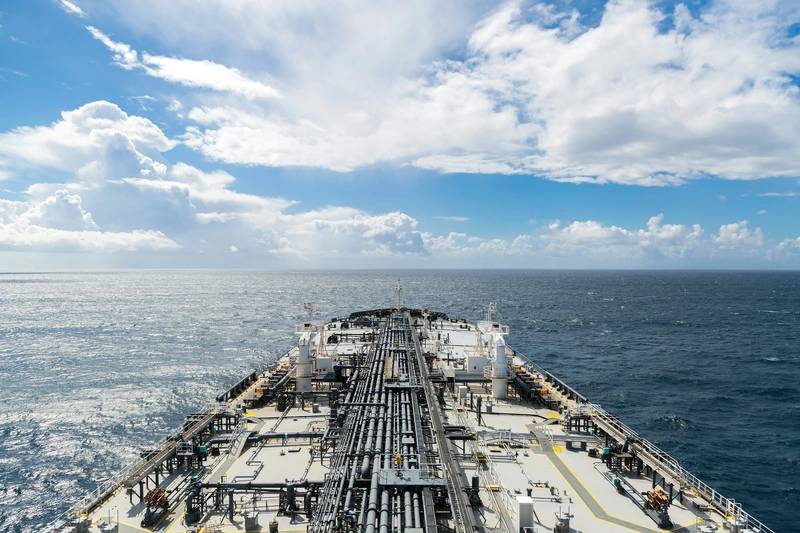US to Reimpose Oil Sanctions on Venezuela
The Biden administration said it would not renew a license set to expire early on Thursday that had broadly eased Venezuela oil sanctions, moving to reimpose punitive measures in response to President Nicolas Maduro’s failure to meet his election commitments.
Just hours before the deadline, the U.S. Treasury Department announced on its website that it had issued a replacement license giving companies 45 days to “wind down” their business and transactions in the OPEC country's oil and gas sector.

Washington had repeatedly threatened in recent months to reinstate energy sanctions unless Maduro made good on his promises that led to partial U.S. sanctions relief from October, following an election deal reached between the government and the Venezuelan opposition.
The sweeping sanctions on Venezuela's oil industry were first imposed by the Trump administration in 2019 following Maduro's re-election victory, which the U.S. and other Western governments rejected.
While Maduro has met some commitments under last year's deal, he has failed to meet others, including allowing the opposition to run the candidate of its choice against him in the July 28 presidential election, senior U.S. officials said on Wednesday.
As a result, the administration plans to allow the current six-month general license to expire without renewal just after midnight EDT, said State Department spokesperson Matthew Miller.
"We are concerned that Maduro and his representatives prevented the democratic opposition from registering the candidate of their choice, harassed and intimidated political opponents, and unjustly detained numerous political actors and members of civil society," Miller said in a statement.
The withdrawal of the most significant element of U.S. sanctions relief marks a major step back from U.S. President Joe Biden's policy of re-engagement with the Maduro government.
The Biden administration, however, is stopping short of a full return to the "maximum pressure" campaign waged under former U.S. President Donald Trump.
Weighing on the U.S. decision have been concerns about whether reimposing sanctions on Venezuela's energy sector could spur higher global oil prices and increase the flow of Venezuelan migrants to the U.S.-Mexico border as Biden campaigns for reelection in November.
Struggle to craft sanctions decision
Biden’s aides had struggled to craft an approach that would punish Maduro but not hurt U.S. interests with the expiration of the license that has allowed Venezuela to freely sell its crude, U.S. sources said.
Venezuelan officials have insisted they are ready for any scenario and can weather renewed U.S. oil sanctions.
"We are prepared commercially,” Oil Minister Pedro Tellechea told reporters earlier on Wednesday at the Caracas headquarters of state oil firm PDVSA. “Logistically, we will continue producing.”
Some companies, he said, may be reluctant to invest in the face of Washington’s “unilateral measures” but most will continue.
Venezuela's oil exports in March rose to their highest level since early 2020 as customers rushed to complete purchases ahead of the predicted expiration of the license, Reuters reported this month.
Even as it left the door open for companies to apply for specific licenses on a case-by-case basis, Treasury warned, however, that "entering into new business, including new investment, that was previously authorized" under the expiring general license will not be permitted.
Since the easing of sanctions in October, Venezuela has made only slow progress toward rebuilding its production capacity, with its crippled infrastructure and lack of fresh investment continuing to place limits on what it can achieve.
The withdrawal of the license is expected to put a ceiling on Venezuela's crude production growth unless Washington grants enough individual authorizations to make up for it, analysts say.
The Biden administration is leaving open the possibility that it could eventually temper its response. One U.S. official said the latest action “should not be viewed as a final decision that we no longer believe Venezuela can hold competitive and inclusive elections,” adding that Washington would continue to engage with Maduro’s representatives.
Any activity under the expiring general license will have to be completed by May 31. The companies' success in securing specific licenses will depend on how permissive the U.S. decides to be.
Certain U.S. authorizations separate from the expiring license will be untouched, including permission given to Chevron since 2022 to sell oil in the U.S. from its Venezuela joint ventures as well as existing approvals for European firms to take Venezuelan oil.
Among the top U.S. concerns about Venezuela’s electoral conditions has been the crackdown on Maduro’s political opponents, especially blocking the leading opposition candidate Maria Corina Machado from running.
Venezuelan authorities have maintained an election ban on Machado, who resoundingly won the opposition primary last October, and the opposition is currently holding internal negotiations about who could run as a substitute.
(Reuters - Reporting by Matt Spetalnick, Daphne Psaledakis and Marianna Parraga; additional reporting by Deisy Buitrago in CaracasEditing by Marguerita Choy)
